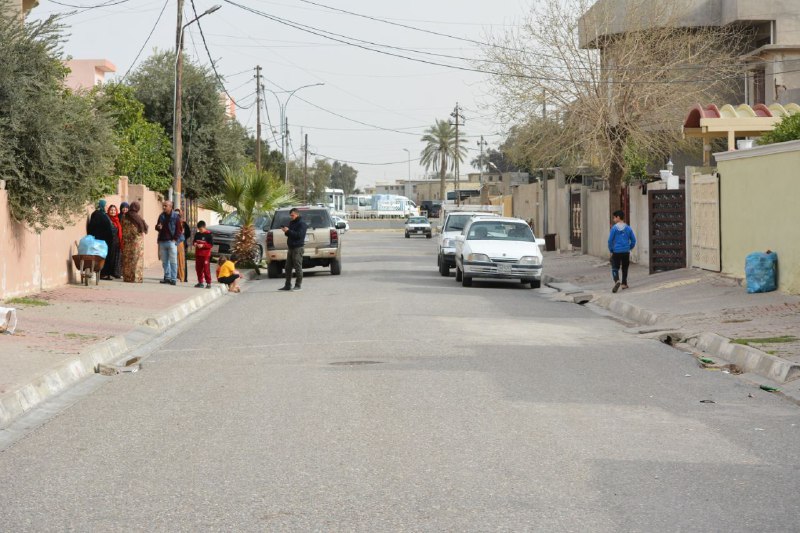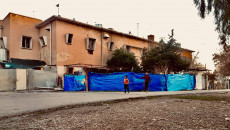The security forces in Kirkuk asked a number of Kurdish families in a neighborhood to vacate their houses based on complaints submitted by a number of officers who served during the rule of the Baath Party, claiming that their ownership belonged to them.
Ownership of over 500 houses of Kurdistan (Al-Faylaq) neighborhood that were ordered to be vacated belongs to the Iraqi Ministry of Defense and was distributed during the period of the Baath regime under Saddam Hussein to senior officers of the Iraqi army serving or residing in Kirkuk province.
Following the fall of the Baath regime led by Saddam Hussein in 2003, these officers, mainly Arabs, left their homes and Kurdish families forced to leave Kirkuk from 1970s through 2003, returned to the city and took over those houses. During the past 19 years, some of these houses have traded several times.
Sarkawt Omar is a teacher and one of the citizens who were officially told on 7 March 2022, by a detachment of the Arafa Police Station and the 61st Special Brigade of the Presidency of the Council of Ministers, to vacate their home.
"They said that I have to vacate my house based on a complaint against us because the house belongs to one of the former officers," Omar said. He pointed out that the officer was given that house during the rule of the Baath regime, and that "the conditions are now favorable for him to expel us and restore the house."
According to information obtained KirkukNow from the Arafa Police Station, during the past months, at least 40 complaints were registered against dozens of Kurdish families living in similar homes.
These houses are located near the neighborhood of Kurdistan (Al-Faylaq). During the rule of the Baath regime, the area was a camp belonging to the Iraqi Ministry of Defense and hundreds of houses were distributed in it to Iraqi officers.
Some are 400 others are 600 square meters, sold for 50-70 million Iraqi Dinars ($30,000-50,000).
But after 2003, the camp was turned into residential plots that were distributed illegally to the displaced people returning to Kirkuk from the governorates of the Kurdistan Region.
"I bought this house and did not take it over illegally.... I never had problems before, but in the past two months they came here twice...They had documents issued by the Kirkuk court and the Iraqi Ministry of Defense," Omar added.
Following fall of Saddam regime in 2003, thousands of people expelled from Kirkuk and disputed territories have received plots of lands from the Kurdish parties ruling the region without being officially registered or permitted by local authorities.

Kirkuk, March 6, 2022: One of the blocs of Kurdistan or Faylaq (Force) neighborhood, once home to former army officers. KirkukNow
This step coincides with the decline in the role of the Kurds and the authority that they enjoyed in the province.
Even before the independence referendum on September 25, 2017, the Kurds had the upper hand in the province, yet following October 16th 2017 Law Enforcement operation, the Iraqi forces returned to the province and forced the Peshmerga and Asayish (Kurdish security) forces of the Kurdistan Regional Government KRG to withdraw and hand over power in the province.
"I am a teacher. The security forces have no right to storm my house and frighten my family... We don't know who to turn to," Omar complained.
The northern oil-rich city of Kirkuk, 238 kilometers north of Baghdad, is an ethnically mixed province for 1.7 million Kurds, Sunni and Shiite Arabs, and Turkmen. It has long been at the center of disputed territories between Baghdad and Erbil.
Kirkuk is one of the main disputed areas in addition to Diyalah and Nineveh that a three-stage process outlined in Article 140 of the Iraqi constitution in 2005, stipulating normalization, a population census and a referendum on the status of the territories, was drawn to put an end to Kurdistan region government KRG and Iraqi Federal government dispute over these areas.
I am Peshmerga (Kurdish fighter) and not ready to evacuate at all
Hama Ziyad Ahmed, another citizen residing in that neighborhood was also asked to vacate his house. “I am affiliated with the Peshmerga (Kurdish fighter) and I have bought this house, I am not ready at all to vacate it,” Ziyad vowed.
During the rule of the Baath regime, tens of thousands of Kurdish families were displaced from Kirkuk to the regions of Kurdistan Region within the framework of the policy of "relocation and Arabization" practiced by the previous regime, and most of those families returned after 2003.
A source in the Arafa police station confirmed that they are implementing the orders of the Kirkuk court and the Iraqi Ministry of Defense, which requires the return of those homes to these officers.
KirkukNow was not able to ascertain whether these houses are officially registered to these officers, or whether they belong to the Iraqi Ministry of Defense.
Kurdish members of Iraqi parliament from Kirkuk said they are negotiating wit hthe Iraqi ministry of defense to sort out the issue of Officers’ houses.
The representative of Kirkuk province within the Patriotic Union of Kurdistan PUK, Dylan Ghafoor, met on Wednesday, March 9, with Iraqi Defense Minister Jumaa Inad in Baghdad in follow-up and search for solution of the issue of Kurdistan neighborhood in Kirkuk.
“We have discussed the issue in detail and are working hard to find a legal exit and solve the problem,” Ghafoor said.
She declined to reveal further details about the ministry's efforts to address the issue, saying, "Now let's wait."





